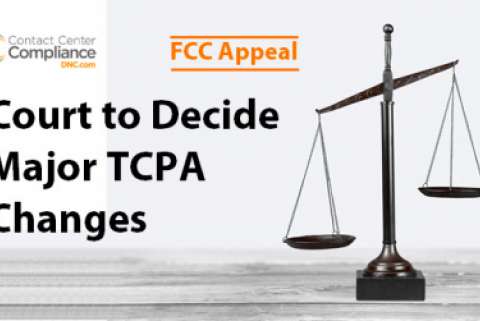It could be the most important court decision to affect the telemarketing industry since the enactment of the Telephone Consumer Protection Act of 1991. The issues of concern in ACA Int’l v. FCC are autodialers, reassigned numbers, and revocation of consent. The United States Court of Appeals heard final arguments in December 2016. Yes, we have waited over a year. The court is obviously feeling the weight of their pending decision as industry leaders and consumer protection advocates anticipate a decision which is expected to significantly cut-back the recent TCPA rulings by the FCC.
The lawsuit ACA Int’l v. FCC stems from the Federal Communications Commission (FCC) comprehensive TCPA Declaratory Ruling and Order in July 2015. It was the FCC’s response to technological advances in the telecommunications industry which had rendered some TCPA regulations obsolete or in need of revision for application to today’s world.
The 2015 FCC Order attempted to provide clarification to the courts for the application of regulations addressed in TCPA lawsuits. The ruling expanded the definition of an “automatic telephone dialing system” (ATDS), the procedures for “revocation of consent” by consumers, and addressed the issue of “reassigned phone numbers”.
Unfortunately, instead of helping, it opened the door wider to court interpretations of the TCPA that often varied from one lawsuit to the next. Without consistency in their rulings, the courts were flooded with what has become a thriving industry for TCPA lawsuits. The effect on businesses is that they are left with no sure way for mounting a solid legal defense.
In response, nine companies appealed the FCC’s 2015 Order to the United States Court of Appeals for the D.C. Circuit. Oral arguments were heard in December 2016 and a decision is expected soon.
The Appeal Issues in Dispute:
1. Clarify the Definition of an Autodialer.
Principal Issue
The FCC’s broad interpretation of an “automatic telephone dialing system” includes all equipment that has the present capacity to store or produce and dial random or sequential phone numbers. That sounds reasonable, but the definition doesn’t stop there. The FCC expanded the definition to include equipment that currently lacks present capacity but could potentially be modified to become an autodialer as defined by the TCPA.
Appeal Argument
The concern for businesses is that the expanded definition of an autodialer is so broad that, if taken to the extreme, smartphones would be included as equipment that could be modified into an autodialer under the FCC interpretation. It’s possible the court will rule that the TCPA does not apply to manually dialed calls and text messages even when they are placed using equipment capable of autodialing.
2. Provide Guidance for Handling Reassigned Phone Numbers.
Principal Issue
The original issue before the FCC was how telemarketers should handle calls to phone numbers which are no longer owned by the persons who originally provided their consent. The FCC pointed out that the marketplace provides a solution for identifying reassigned phones numbers. With that in mind, the FCC created the “one-call exemption” which allows businesses to call reassigned numbers once without liability, but only once regardless of whether the call was answered or not.
Appeal Argument
The “one-call exemption” is arbitrary because the caller may have no actual knowledge at the time the call is made that the number has been reassigned. Businesses make calls based on the assumption that the current owner of the number is the expected recipient who had provided consent. The FCC’s ruling also made no distinction between answered and unanswered calls.
Currently over 100,000 phone numbers are reassigned every day. For more information on this important issue read our article, Reassigned Phone Numbers: The One-Call Rule Solution.
3. Provide Consistent Standards for Consumer Revocation of Consent.
Principal Issue
The FCC ruled that consumers can revoke consent at any time and by any reasonable means.
Appeal Argument
The revocation standard puts and excessive burden on callers who must review responses to determine which ones are revocations. A recent example of the confusion caused by this regulation can be found in our article, Court Dismisses Kohl’s TCPA Class Action. In that case, the text messaging recipient responded with repeated sentence long texts to revoke consent. The texts were not recognized by the sender’s automated system which replied with a message that included instructions to text the word STOP to revoke consent. The consumer chose to ignore those instructions.
Conclusion
The ruling is expected soon. Several TCPA class actions are currently on hold pending the courts response to ACA Int’l v. FCC. Of the cases that continue, there is no consistent standard for the courts to follow in their rulings on TCPA lawsuits.
For now, some courts continue to apply the common sense approach when defining equipment as an autodialer. They look at whether the equipment in questions has been used to a sufficient degree to establish liability under the TCPA. Yet, other courts apply the broader standard of potential capacity of equipment to be modified into an autodialer.
Working in favor of the telemarketing industry is that the current Chairman of the FCC, Ajit Pai, has been a proponent for change at the FCC and critical of the 2015 FCC Order that has caused so much confusion.
No matter what the court decides, the ramifications will significantly impact businesses operating under the TCPA regulations as we continue into 2018 and beyond.
Upcoming Webinar:
How Major TCPA Ruling Impacts Your Business
This event will take place after the court ruling on the 2015 FCC Order.
Sign-up for Notification of the DATE and TIME





